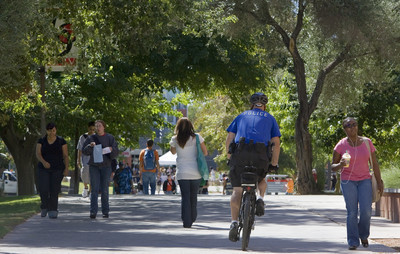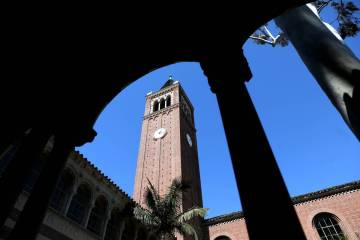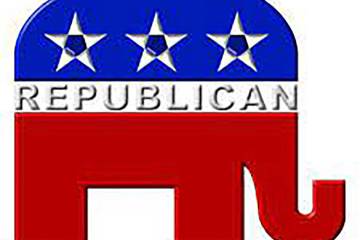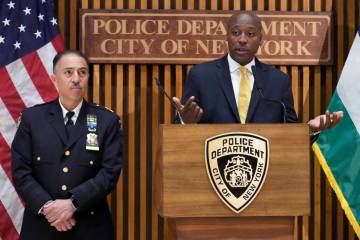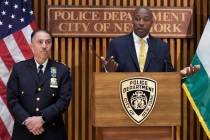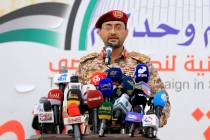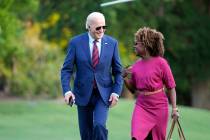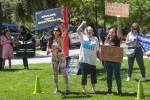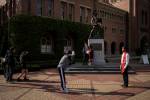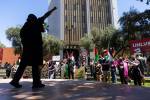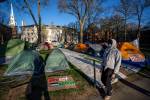Plan faces faculty opposition
It appeared that university system regents would be the last line of defense against arming faculty on campus, an idea born of the April shootings at Virginia Tech.
The regents are poised to vote on the plan next week. But regardless of how the vote goes, it appears that college and university presidents might take a last stand against a proposal unpopular in the faculty ranks.
The plan to deputize faculty and staff allows the presidents of the eight Nevada institutions of higher learning to reject any requests by faculty members who want to undergo the police academy training and carry a firearm on campus.
And the presidents of Nevada's two universities have given every indication that they'll use this provision to kill the plan.
University of Nevada, Las Vegas President David Ashley said last week that the plan would be a "significant expense" and that he wouldn't allow university employees to go through the police academy unless it pertained to their job.
He said he couldn't think of any example where the training would pertain to the job of anyone in a teaching role.
At the University of Nevada, Reno, President Milton Glick said "it would have to be an extraordinary position" for him to pay for the training and time off for a faculty member to go through the program.
The stance of the two presidents is likely to please thousands of faculty and staff at the two universities, where both faculty senates have denounced the proposal.
The plan, drafted by the system's four police chiefs and higher education officials, would require the university to pay for an employee to take roughly three months off to go through the police academy, and pay for the estimated $3,200 the academy would cost.
The plan to create a reserve police force of faculty and staff has support at the College of Southern Nevada, where interim President Mike Richards said he would consider applicants on a case-by-case basis.
The interim president at Truckee Meadows Community College did not return calls for comment. Only UNLV, CSN, TMCC and UNR have police departments, and each of their police chiefs has endorsed the program.
Regent Stavros Anthony, a Las Vegas police captain who drafted the proposal, said he empowered presidents to choose who goes through the program because the presidents wanted more authority over it.
"I'm trying to make this as nonconfrontational as possible because I know it's been unpopular," he said.
But he said he didn't think a university or college president had carte blanche to say "nobody can go through that program."
"I guess we'd have to cross that bridge when we get to it," he added.
The five-member Cultural Diversity and Security committee, of which Anthony is chairman, will hear the proposal Oct. 11 during the Board of Regents meeting in Las Vegas.
The committee members are split on the issue. Along with Anthony, Regent Jack Lund Schofield said he supported the policy, while Regent Dorothy Gallagher said she wanted more information before making up her mind. Regent Cedric Crear couldn't be reached for comment.
But Regent Howard Rosenberg, the only regent who is also a professor, is emphatically opposed to it. He said he'd rather the system spend more money to hire full-time police officers than arm faculty members.
"You don't do it (campus security) on the cheap when student safety is at risk," he said.
Several of the faculty senates already have voted against the measure, and usually resoundingly so. At UNLV, the senate voted 38-0 against it, with three members abstaining.
The CSN faculty senate is scheduled to vote on the proposal this week and is expected to reject it.
The chairmen of Nevada's eight faculty senates have also drafted a letter to regents expressing their displeasure with the idea.
Faculty and staff have largely been worried about how carrying guns in the classroom will affect their mission as educators, and whether they'll become primary targets should someone decide to wreak havoc on campus.
"I am in agreement with our faculty," Glick said. "This is not the role we want our faculty playing."
Many consider the idea a knee-jerk reaction to the shootings at Virginia Tech, where 33 people were killed, including the gunman.
Even the Virginia Tech Review Panel, the independent commission tasked with investigating the incident, didn't recommend arming faculty, UNLV faculty senate chairman Bryan Spangelo said.
"Faculty very much care how they're perceived in other parts of the country," he said. "And they don't want their peers thinking of us in Nevada as being armed, or even having the possibility of being armed."
Faculty also believe the money could be better spent elsewhere, according to CSN faculty senate chairwoman Judy Stewart.
Those wanting to go through the program would become POST-certified, requiring 21 weeks of police academy training. During that time, the faculty member would have to be replaced in order to teach the abandoned classes, Stewart said.
The university also would pay the estimated $3,200 for the police academy training and equipment.
After the training, faculty would be certified reserve police officers with the campus police department and allowed to carry guns in the classroom. They wouldn't have to wear uniforms and would respond only to a crisis on campus.
Anthony said the plan would be far cheaper than hiring more police officers to patrol the campus.
Police officers are the only people who don't need permission to carry a gun on campus. Anybody else needs approval from the university president, and campus police chiefs say they recommend that the president deny that right to any applicant.
UNLV has yet to obtain a system that can reach massive numbers of students through their cell phones, one of the key recommendations made by several national law enforcement and safety organizations.
It plans to send out a bid request for such a system in the next few weeks. The university has a system that can quickly call UNLV numbers.
Since the shootings at Virginia Tech, university police have stepped up visibility on campus, and university officials are looking at moving the department from its location on the southeast corner of Tropicana Avenue and Swenson Street to a leased spot at the current American Cancer Society building across Maryland Parkway on Harmon Avenue.
The new location would boost visibility and improve response times, said Gerry Bomotti, UNLV vice president for finance and operations. UNLV police no longer would have to cross congested Tropicana Avenue to get to the campus.
Some faculty members have expressed concerns that Anthony's proposal has overshadowed other plans to make the campus safer.
Chancellor Jim Rogers, who initially expressed support for the measure, now says he will defer judgment to the college and university presidents who deal with faculty every day.
And he expressed doubt that such a plan, if adopted, would be popular among the state's professors.
"These people are generally very passive. They just are," Rogers said. "And so I can't see a professor of English who's teaching Shakespeare one afternoon and leaving and strapping on a gun."



